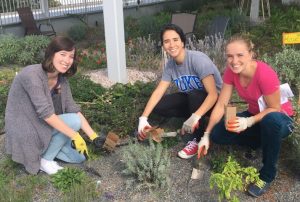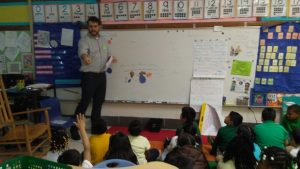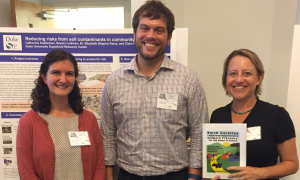Community gardens can be a source of healthy food, exercise, and connections to nature and each other. But contaminants –chemical substances that can cause harm to human health—are sometimes found in soil at garden sites and may present health risks, especially for vulnerable populations like children and pregnant women.
As part of our efforts at the Duke Superfund Research Center to facilitate the transfer of environmental health and toxic exposure research to the general public, the Research Translation Core (RTC) has initiated a project with community gardeners across North Carolina. Our goal is to help gardeners make informed decisions about how to reduce their exposures to potential contaminants like lead, arsenic, PAHs, and pesticides. We are partnering with organizations such as North Carolina Community Garden Partners, the North Carolina Cooperative Extension Service, the Environmental Protection Agency, and other experts to achieve our goals.

Duke RTC staff are receiving research support for the first phase of the project from three graduate students from the Nicholas School: Sofia Tenorio Fenton, Reilly Henson, and Elissa Tikalsky. The students are conducting research focused on gardener behaviors and garden management choices that may lead to exposure risks from potentially contaminated soil. The group’s contributions are also allowing them to fulfull the research requirements for their final Masters Project toward the Masters of Environmental Management degree.
The student group is partnering with four community gardens across the state to conduct site visits, interviews, and focus groups to better understand gardeners’ behavior and perceptions. The students are also collecting online survey responses from community gardeners around the state of North Carolina to get a broader picture of the potential contamination issues and existing mitigation strategies. The RTC will use the results of their qualitative research to inform a social marketing campaign aimed at promoting behaviors that decrease risk.

This project also includes the development of maps to screen for at risk locations of contamination in community gardens. The RTC is developing maps, with help from partners at NC State, Duke’s Nicholas School of the Environment, and other experts, to indicate potentially high risk areas of garden contamination. Data sources include EPA’s EJ Screen and C-FERST environmental justice exposure mapping tools, along with other environmental databases.
Preliminary results and methods have been presented at multiple events over the past year, including the North Carolina Environmental Justice Summit and the National Institute of Environmental Health Sciences 2016 EHS Fest, as well as at a board meeting for the North Carolina Community Garden Partners in January 2017.

The next steps for this project include continuing focus group sessions with community gardeners and the development of educational materials and decision making tools that will allow gardeners to reduce exposure to soil contaminants and pesticides in gardens. Results for the first phase of the project are expected by summer 2017. Stay tuned for updates!




